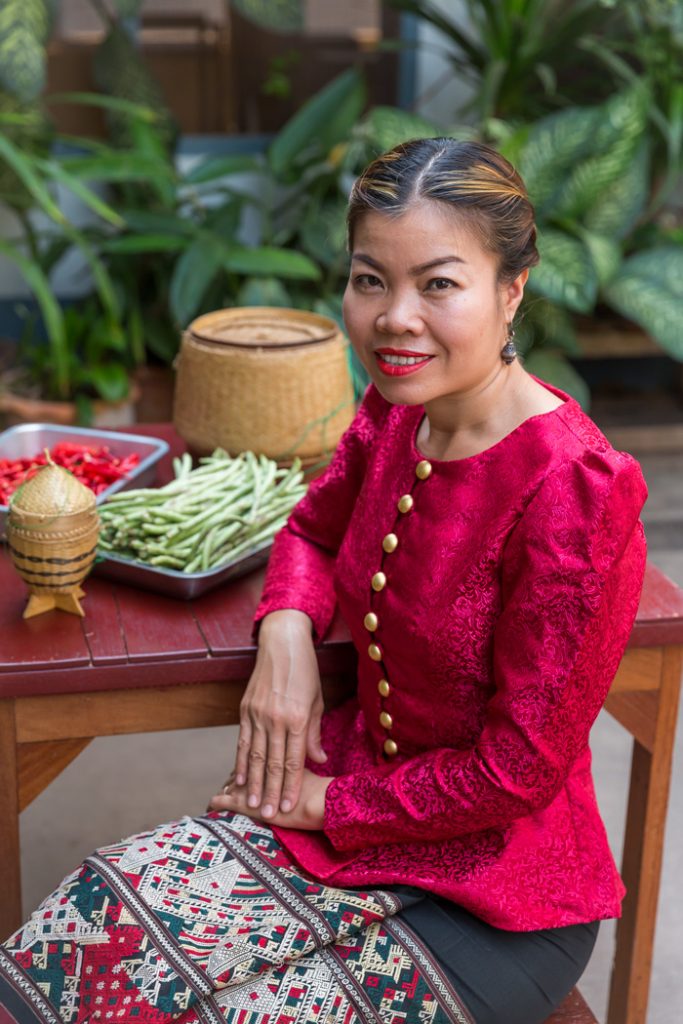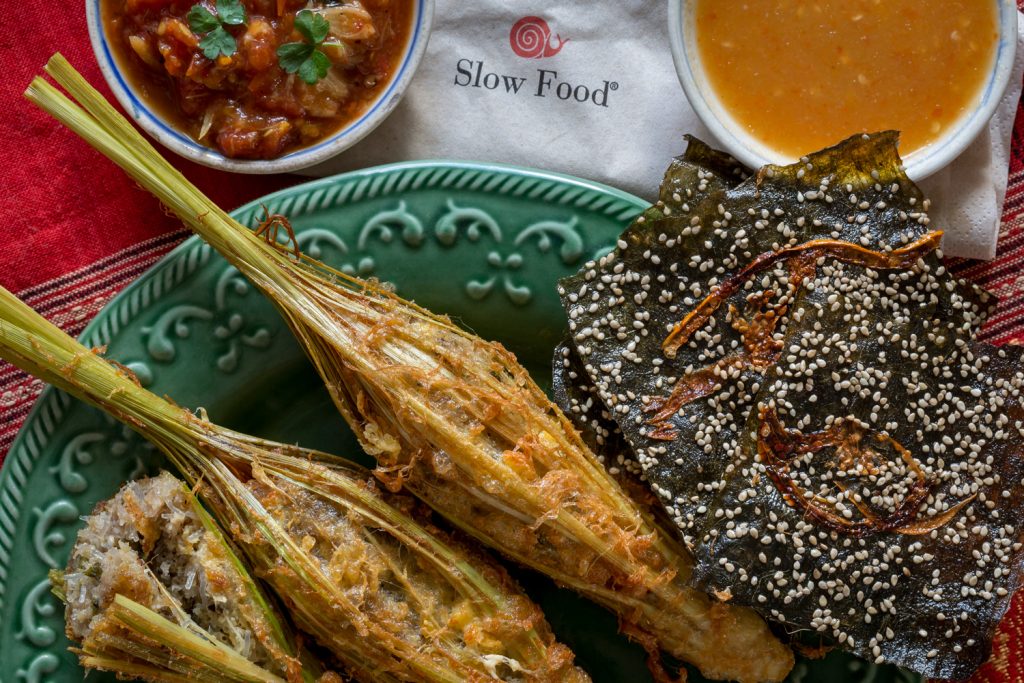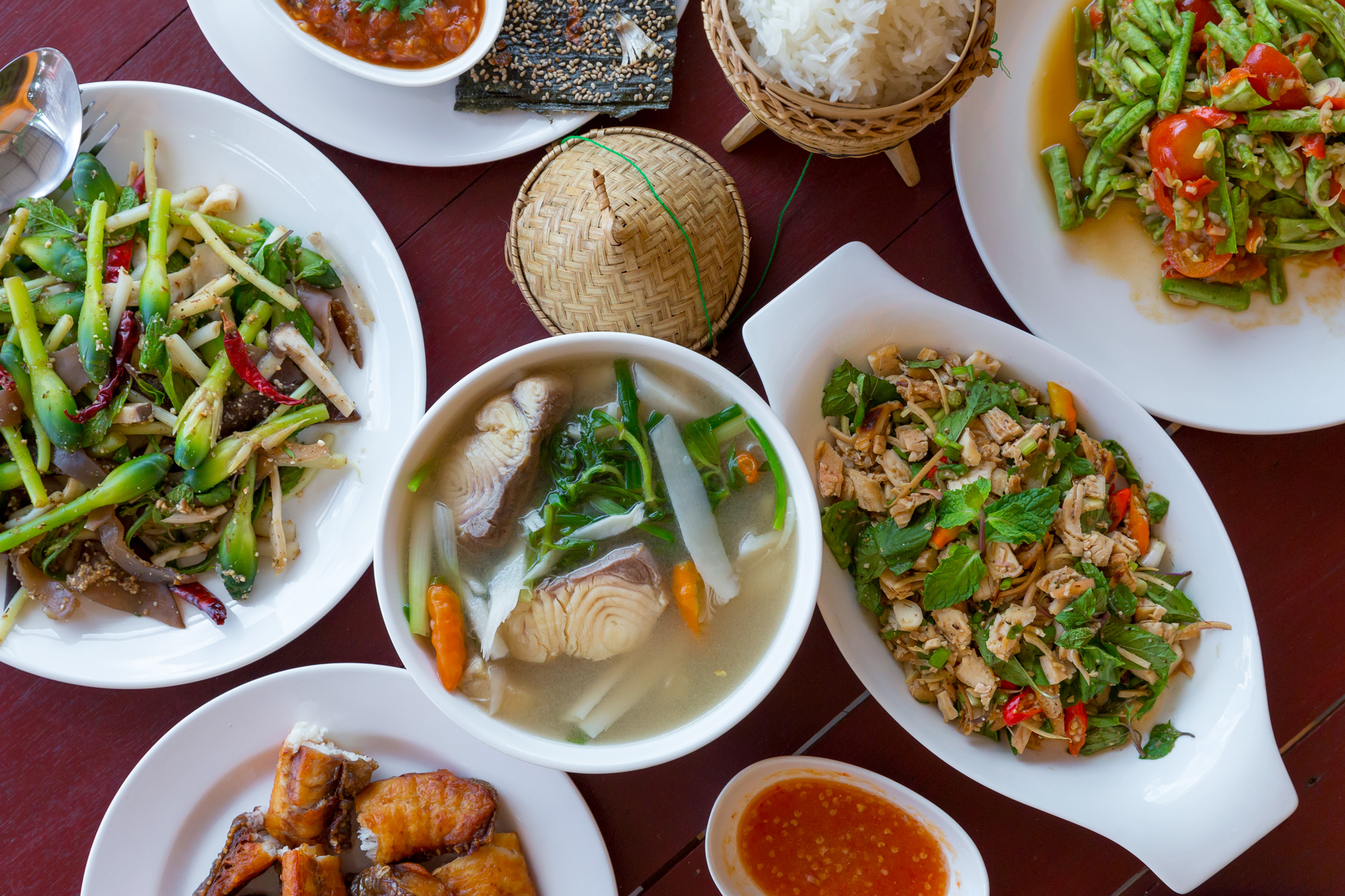ປະເທດລາວເຮົາ ເປັນປະເທດນ້ອຍໆ ທີ່ຖືກອ້ອມ ແອ້ມໂດຍບັນດາປະເທດໃຫຍ່ທີ່ຂຶ້ນຊື່ດ້ານອາຫານ ບໍ່ວ່າຈະເປັນ ຫວຽດນາມ, ໄທ ແລະ ຈີນ, ຈຶ່ງເຮັດໃຫ້ ອາຫານລາວ ບໍ່ຄ່ອຍໄດ້ຖືກຮັບຮູ້ ແລະ ເປັນທີ່ນິຍົມ ເທົ່າທີ່ຄວນ, ແຕ່ມີແມ່ຄົວຜູ້ໜຶ່ງຢູ່ວຽງຈັນ ທີ່ມີໃຈ ມັກຮັກ ໃນການປຸງແຕ່ງ ອາຫານລາວ ແລະ ມີຄວາມ ຕັ້ງໃຈ ທີ່ຈະເຮັດໃຫ້ ອາຫານລາວ ກາຍເປັນທີ່ຮັບຮູ້ ໃນທົ່ວໂລກ.
ໃນທ່າມກາງສັງຄົມປັດຈຸບັນ ທີ່ພວມຂະຫຍາຍ ຕົວຢ່າງໄວວາ, ສິ່ງທີ່ສຳຄັນ ສຳລັບ ພອນໄພລິນ ແກ້ວດວງດີ ຫຼື ນ້ອຍ ແມ່ນການ ເພີດເພີນໄປກັບການດຳລົງຊີວິດ ແບບຊ້າໆ ແລະ ເອົາໃຈໃສ່ໃນອາຫານ, ນັບຕັ້ງແຕ່ການຄັດສັນເອົາ ສ່ວນປະກອບທີ່ສົດໃໝ່ ແລະ ຜະລິດຢູ່ພາຍໃນ, ໄປຈົນຮອດການຮັກສາສູດອາຫານດັ້ງເດີມ, ທີ່ສຳຄັນທີ່ສຸດແມ່ນການເພີດເພີນໄປກັບ ການແຕ່ງຢູ່ຄົວກິນແບບບໍ່ຟ້າວບໍ່ຟັ່ງ ແລະ ແບ່ງປັນໃຫ້ໝູ່ຄູ່ ແລະ ຄອບຄົວໄດ້ກິນນຳກັນ.

ນ້ອຍເປັນທັງເຈົ້າຂອງຮ້ານ ແລະ ແມ່ຄົວໃຫຍ່ປະຈຳ ຮ້ານ ໂດຍຂະນ້ອຍ ເຊິ່ງເປັນຮ້ານທີ່ມີເອກະລັກ ສະເພາະ, ເສີບອາຫານລາວ ແບບດັ້ງເດີມ ແລະ ເມນູກໍ່ປ່ຽນໄປແຕ່ລະມື້. ນອກນັ້ນ, ລາວຍັງເປັນ ຄົນລາວຜູ້ທຳອິດທີ່ເປັນ ສະມາຊິກອົງກອນ Slow Food (ສະໂລ ຟູດ), ເຊິ່ງນ້ອຍກ່າວວ່າ ລາວຮູ້ສຶກຕື່ນເຕັ້ນຫຼາຍ ຕອນທີ່ຮູ້ຂ່າວ ກ່ຽວກັບ Slow Food ເພາະມັນເປັນອົງກອນທີ່ສະທ້ອນ ໃຫ້ເຫັນເຖິງແນວຄວາມຄິດໃນການດຳລົງຊີວິດ ແລະ ການແຕ່ງຢູ່ຄົວກິນຂອງຄົນລາວ.
Slow Food ເປັນອົງກອນແບບຮາກຖານທີ່ສ້າງ ຕັ້ງຂຶ້ນໃນປີ 1989 ໂດຍ ຄາໂລ ເປຕຣີນີ ເຊິ່ງຈຸດປະສົງກໍ່ແມ່ນເພື່ອປົກປ້ອງບໍ່ໃຫ້ປະເພນີ ແລະ ວັດທະນະທຳ ອາຫານພາຍໃນທ້ອງຖິ່ນ ສູນຫາຍໄປ, ແລະ ຕອບໂຕ້ກັບການດຳເນີນຊີວິດ ແບບຟ້າວຟັ່ງ ທີ່ນັບມື້ນັບເພີ່ມຂຶ້ນ, ທັງຍັງເປັນການສົ່ງເສີມໃຫ້ຄົນ ຫັນມາໃສ່ໃຈກັບອາຫານທີ່ເຮົາກິນ ວ່າອາຫານ ມາແຕ່ໃສ ແລະ ມີຜົນກະທົບຕໍ່ສິ່ງອ້ອມຂ້າງເຮົາຄືແນວໃດແດ່. ມາຮອດປັດຈຸບັນ, Slow Food ໄດ້ຜັນຂະຫຍາຍ ມາເປັນ ຂະບວນການເຄື່ອນໄຫວ ລະດັບໂລກ ທີ່ລວມມີຫຼາຍລ້ານຄົນໃນກວ່າ 160 ປະເທດ, ທຸກຄົນເຮັດວຽກຮ່ວມກັນເພື່ອຊ່ວຍຮັບປະກັນວ່າ ພວກເຮົາສາມາດເຂົ້າເຖິງ ອາຫານທີ່ດີແລະ ສະອາດ. ນ້ອຍເອງກໍ່ຄິດວ່າ ເປົ້າໝາຍ ແລະ ຄ່ານິຍົມຂອງອົງກອນດັ່ງກ່າວນີ້ ແທດເໝາະກັບສັງຄົມລາວໃນຍຸກສະໄໝໃໝ່ນີ້ຫຼາຍ.
ນ້ອຍກ່າວວ່າ ມັນກໍ່ເປັນສິ່ງທີ່ດີ ທີ່ປະເທດເຮົາພວມ ຂະຫຍາຍຕົວຢ່າງໄວວາ, ແຕ່ໃນຂະນະດຽວກັນ ກໍ່ເລີ່ມຮູ້ສຶກໄດ້ວ່າ ວິຖີການດຳລົງຊີວິດທີ່ປ່ຽນໄປ ທຸກມື້ນີ້ ບວກກັບອຸດສາຫະກຳ ອາຫານຂະໜາດໃຫຍ່ ກຳລັງສົ່ງຜົນກະທົບຫຼາຍ ຕໍ່ວັດທະນະທຳ ແລະ ປະເພນີອາຫານການກິນຂອງເຮົາ.
ໃນຕອນທີ່ນ້ອຍເປີດຮ້ານໃໝ່ໆ ປີກາຍນີ້, ຮ້ານຂອງລາວ ກໍ່ສ້າງຊື່ສຽງຢ່າງໄວວາ ເນື່ອງຈາກວ່າມີເມນູ ອາຫານຫຼາກຫຼາຍ ແລະ ປ່ຽນໄປແຕ່ລະມື້.
ປີກາຍນີ້ ລາວຍັງໄດ້ຖືກຮັບເຊີນ ໃຫ້ເຂົ້າຮ່ວມງານຂອງ Slow Food ທີ່ຈັດຂຶ້ນທຸກໆສອງປີ, ຊື່ງານ Terra Madre del Gusto ໃນເມືອງຕູຣິນ ຢູ່ທາງພາກເໜືອຂອງ ປະເທດອິຕາລີ. ນ້ອຍກ່າວວ່າ ລາວຮູ້ສຶກ ພູມໃຈຫຼາຍທີ່ເປັນ ຄົນລາວຜູ້ທຳອິດ ທີ່ເຂົ້າ ຮ່ວມງານດັ່ງກ່າວ ເພາະອາຫານລາວຍັງບໍ່ຄ່ອຍເປັນທີ່
ຮູ້ຈັກຫຼາຍຢູ່ຕ່າງປະເທດ, ແລະ ມັນກໍ່ເປີດໂອກາດໃຫ້ລາວໄດ້ນຳສະເໜີອາຫານ ແລະ ວັດທະນະທຳລາວ ໃຫ້ໂລກໄດ້ຮັບຮູ້. ນອກນັ້ນ ລາວຍັງໄດ້ພົບກັບ ພໍ່ຄົວແມ່ຄົວ, ຊາວໄຮ່ຊາວສວນ ແລະ ບຸກຄົນຈາກ ທົ່ວໂລກທີ່ລ້ວນແລ້ວແຕ່ມີຄວາມສົນອົກສົນໃຈໃນວັດທະນະທຳການກິນ ແລະ ບັນຫາຕ່າງໆ ທີ່ພວກເຮົາພວມປະເຊີນໜ້າຢູ່, ລາວຈຶ່ງຮູ້ສຶກວ່າ ປະສົບການນີ້ໄດ້ຊ່ວຍເສີມສ້າງຄວາມເຂັ້ມແຂງໃຫ້ລາວຫຼາຍ. ຕອນຢູ່ເມືອງຕູຣິນ, ນ້ອຍແຕ່ງອາຫານຢູ່ໃນກຸ່ມອາຊີ ແລະ ໂອເຊອາເນຍ, ແລະ ເມນູທີ່ລາວນຳສະເໜີ ປະກອບມີ ອົ່ວຫົວສີໄຄ, ແຈ່ວໝາກເລັ່ນ ແລະ ໄຄແຜ່ນຫຼວງພະບາງ. ມີເລື່ອງເປັນຕາຫົວອັນໜຶ່ງ ຕອນນ້ອຍສົ່ງຊື່ເມນູໄປລ່ວງໜ້າ, ແຕ່ພໍໄປຮອດງານ ເຂົາເຈົ້າປ່ຽນຊື່ເມນູນ້ອຍຈາກຄຳວ່າ “ຫົວສີໄຄຍັດໄສ້ໝູ” ເປັນຄຳວ່າ “ໝູຍັດໄສ້ຫົວສີໄຄ” ເພາະເຂົາເຈົ້າຄິດວ່ານ້ອຍຂຽນຜິດ ເພາະບໍ່ເຊື່ອວ່າ ຈະສາມາດເອົາຊີ້ນໝູ ຍັດໃສ່ຫົວສີໄຄຫົວນ້ອຍໆໄດ້, ແຕ່ພໍພໍ່ຄົວຜູ້ອື່ນໆມາເຫັນ ຕອນນ້ອຍຝານຫົວສິໄຄ ແລະ ຍັດຊີ້ນໝູໃສ່ ກໍ່ພາກັນແປກໃຈໄປນຳກັນ.

ອົງກອນ Slow Food ຍັງເປັນຜູ້ລິເລີ່ມເຮັດບັນຊີລາຍການ Ark of Taste (ອາກ ອ໋ອບ ເທສ)ຂຶ້ນມາເພື່ອຮວບຮວມ ແລະ ຄົ້ນຄວ້າອາຫານທ້ອງຖິ່ນໃນແຕ່ ລະຂົງເຂດ ເພື່ອເປັນການສົ່ງເສີມ ແລະ ອານຸລັກ ວັດຖຸດິບທ້ອງຖິ່ນ, ທັງຍັງສະໜັບສະໜູນຜູ້ຜະລິດ ຂະໜາດນ້ອຍນຳ. ນ້ອຍ ໄດ້ສະເໜີຊື່ໄຄແຜ່ນ ເຂົ້າໃນ ລາຍການ ແລະ ກໍ່ດີໃຈຫຼາຍທີ່ໄຄແຜ່ນໄດ້ຖືກຮັບຮອງເຂົ້າໃນບັນຊີ ລາຍການ Ark of Taste, ເພາະຢູ່ລາວ ເຮົາ ແມ່ນມີຜະລິດຕະພັນ ພື້ນເມືອງຫຼາຍຢ່າງທີ່ຄວນຄ່າແກ່ການປົກປັກຮັກສາ ແລະ ລາວເອງ ກໍ່ຕັ້ງໃຈທີ່ຈະສະເໜີຊື່ຜະລິດຕະພັນອື່ນໆຕື່ມອີກ.
ພິເສດ ຢູ່ງານດັ່ງກ່າວ ນ້ອຍຍັງໄດ້ພົບກັບ ຄາໂລ ເປຕຣີນີ ເຊິ່ງເປັນຜູ້ກໍ່ຕັ້ງ ແລະ ເປັນປະທານ Slow Food. ຄາໂລ ມີຊື່ສຽງໂດ່ງດັງ ແລະ ເປັນແຮງບັນດານໃຈ ໃຫ້ຫຼາຍພັນຄົນໃນທົ່ວໂລກ. ໃນນາມທີ່ເປັນສະມາຊິກລາວຜູ້ທຳອິດ, ນ້ອຍຖາມລາວວ່າ ນ້ອຍ ສາມາດເຮັດຫຍັງໄດ້ແດ່ ເພື່ອສົ່ງເສີມວຽກງານຂອງ Slow Food ພາຍຫຼັງທີ່ນ້ອຍກັບເມືອ ວຽງຈັນ. ລາວຕອບວ່າ ນ້ອຍຄວນຈະສືບຕໍ່ ຮັກສາຄວາມອຸດົມສົມບູນຂອງອາຫານ ແລະວັດທະນະທຳພື້ນເມືອງລາວ,ແລະ ໃຫ້ນ້ອຍປະສານສົມທົບ ກັບຊາວໄຮ່ຊາວສວນໃນພື້ນທີ່ນຳ. ຄາໂລເວົ້າຕື່ມວ່າ ສິ່ງທີ່ສຳຄັນແມ່ນຕ້ອງມີຄວາມສຸກໃນການເຮັດວຽກ ລາວເຊື່ອວ່າຄວາມມັກຮັກໃນອາຫານລາວຈະເຮັດໃຫ້ນ້ອຍສາມາດເຮັດໃຫ້ຫຼາຍຄົນຕິດໃຈອາຫານຂອງນ້ອຍໄດ້. ນ້ອຍເວົ້າວ່າ ຫຼັງຈາກທີ່ໄດ້ຍິນ ລາວຮູ້ສຶກຕື້ນຕັນໃຈຈົນນ້ຳຕາໄຫຼ. ນ້ອຍກ່າວວ່າ ໃນໄລຍະຫຼັງນີ້, ຮ້ານອາຫານຢູ່ວຽງຈັນ ເປີດຂຶ້ນເປັນຈຳນວນຫຼາຍ, ແຕ່ເຖິງວ່າຈະມີຕົວເລືອກຫຼາຍຂຶ້ນ, ແຕ່ອາຫານຂອງລາວເຮົາໄດ້ຮັບຜົນກະທົບ ຈາກຄວາມນິຍົມຂອງອາຫານແບບປະສົມປະສານ,ອາຫານຈານດ່ວນ ແລະ ຮ້ານອາຫານສາກົນ. ພໍ່ຄົວກໍ່ໃຊ້ ສ່ວນປະກອບ ຄຸນນະພາບຕ່ຳ, ໃຊ້ແປ້ງນົວ, ແລະ ໄວໜຸ່ມຍຸກໃໝ່ກໍ່ ບໍ່ຄ່ອຍມີຄວາມສົນໃຈ ໃນອາຫານຂອງ ປະເທດຕົນເອງ. ນ້ອຍກ່າວຕື່ມວ່າ ສິ່ງທີ່ລາວຄົ້ນພົບຢູ່ງານ ເທຣາ ມາເດຣ ເດລ ກູສໂຕ ແມ່ນວ່າ ລາວບໍ່ແມ່ນຜູ້ດຽວ ທີ່ເຊື່ອວ່າ ວັດທະນະທຳອາຫານຂອງລາວ ຄວນຄ່າແກ່ການປົກປ້ອງ. ປັດຈຸບັນມີຄົນຫຼາຍລ້ານຄົນໃນທົ່ວໂລກທີ່ກຳລັງ ຕໍ່ສູ້ເພື່ອປົກປັກຮັກສາ ແລະ ສົ່ງເສີມວັດທະນະທຳການປຸງແຕ່ງອາຫານ ແລະ ວັດຖຸດິບທ້ອງຖິ່ນ, ແລະ ຢູ່ວຽງຈັນນ້ອຍເອງກໍ່ໂຊກດີທີ່ມີລູກຄ້າທີ່ເຂົ້າໃຈໃນສິ່ງທີ່ລາວພະຍາຍາມເຮັດຢູ່ ແລະ ລາວກໍ່ຕື້ນຕັນໃຈ
ຫຼາຍທີ່ລູກຄ້າໄດ້ໃຫ້ ການສະໜັບສະໜູນ ແລະ ໃຫ້ກຳລັງໃຈລາວ.
ໃນເດືອນກ່ອນນີ້, ວະລາດີເມຍ ເຊິ່ງເປັນພໍ່ຄົວ ຊື່ດັງຄົນເດັນມາກ, ຜູ້ຊະນະລາຍການ ມາສເຕີ້ເຊັບ ສອງຄັ້ງ, ນັກຂຽນຕຳລາອາຫານ ແລະ ຜູ້ຈັດລາຍການໂທລະທັດໄດ້ ເດີນທາງມາວຽງຈັນ ໃນນາມມູນນິທິແຄ (CARE) ເຊິ່ງນ້ອຍກໍ່ມີ ໂອກາດເຜີຍແຜ່ວິທີຄົວກິນແບບ ລາວໃຫ້ເພິ່ນຟັງ.
ພໍ່ຄົວຊື່ດັງ ໄດ້ຄົ້ນພົບວ່າຢູ່ຮ້ານ ໂດຍຂະນ້ອຍ, ທຸກສ່ວນປະກອບຂອງອາຫານແມ່ນຊື້ມາ ສົດໆຈາກຕະຫຼາດທຸກເຊົ້າ, ແລະ ນ້ຳແກງ ແລະ ເຄື່ອງປຸງແມ່ນກະກຽມໂດຍໃຊ້ວິທີແບບ ປະຖົມປະຖານ ທີ່ບໍ່ຈຳເປັນຕ້ອງໃສ່ແປ້ງນົວ, ແລະ ໃສ້ອົ່ວກໍ່ເຮັດເອງທຸກອັນ. ເມນູອາຫານ ຢູ່ຮ້ານ ມີແຕ່ 7-8 ເຍື່ອງ ແລະ ປ່ຽນໄປແຕ່ລະມື້, ເຊິ່ງສ່ວນປະກອບກໍ່ລວມມີ ດອກກະຈຽວ, ເຫັດບີ້ທີ່ຫາຍາກ, ຜັກກູດ, ແລະ ສ່ວນປະກອບພື້ນເມືອງອື່ນໆ. ນ້ອຍເປັນແມ່ຄົວທີ່ມີ ໃຈມັກຮັກ ແລະ ຫຼົງໄຫຼໃນການປຸງແຕ່ງອາຫານ ແລະ ຮ້ານ ໂດຍຂະນ້ອຍ ບໍ່ໄດ້ເປັນພຽງແຕ່ ຮ້ານອາຫານທົ່ວໄປ ເທົ່ານັ້ນ, ແຕ່ມັນເປັນບ່ອນທີ່ສະທ້ອນໃຫ້ເຫັນເຖິງປະຫວັດຄວາມເປັນມາ ຂອງນ້ອຍ ແລະ ວິຖີການດຳລົງຊີວິດຂອງລາວ. ນ້ອຍຮຽນແຕ່ງກິນນຳແມ່ເຖົ້າ ແຕ່ຍັງນ້ອຍ ແລະ ສູດອາຫານທີ່ລາວນຳໃຊ້ທຸກມື້ນີ້ແມ່ນຈື່ມາຈາກທີ່ແມ່ເຖົ້າສອນ.
ນ້ອຍ ເຕີບໃຫຍ່ຢູ່ຊຸມຊົນຊາວໄຮ່ຊາວສວນຢູ່ແຂວງຄຳມ່ວນ, ແລະ ເຖິງແມ່ນວ່າປັດຈຸບັນລາວ ຈະກາຍເປັນສາວໃນເມືອງ, ລາວກໍ່ຍັງຄົງມັກຮັກໃນການປູກຜັກ ແລະ ສະໝຸນໄພຢູ່ສວນ ຢູ່ຮ້ານ ໂດຍຂະນ້ອຍ. ນອກນັ້ນ, ນ້ອຍກໍ່ເລັງເຫັນເຖິງຄວາມສຳຄັນ ໃນການຊອກຫາແຫຼ່ງທີ່ມາ ຂອງສ່ວນປະກອບຕ່າງໆ ທີ່ນຳໃຊ້ໃນການປຸງແຕ່ງອາຫານ ແລະ ລາວກໍ່ປະສົງທີ່ຈະຄັດສັນເອົາ ແຕ່ພືດພັນທຳມະຊາດແບບປອດສານພິດ ຈາກຊາວໄຮ່ຊາວສວນພາຍໃນທ້ອງຖິ່ນ ເພື່ອຊ່ວຍສົ່ງເສີມການພັດທະນາແບບມີສ່ວນຮ່ວມໃນສັງຄົມລາວ.
ບົດແລະຮູບໂດຍ: Mick Shippen



 English
English
